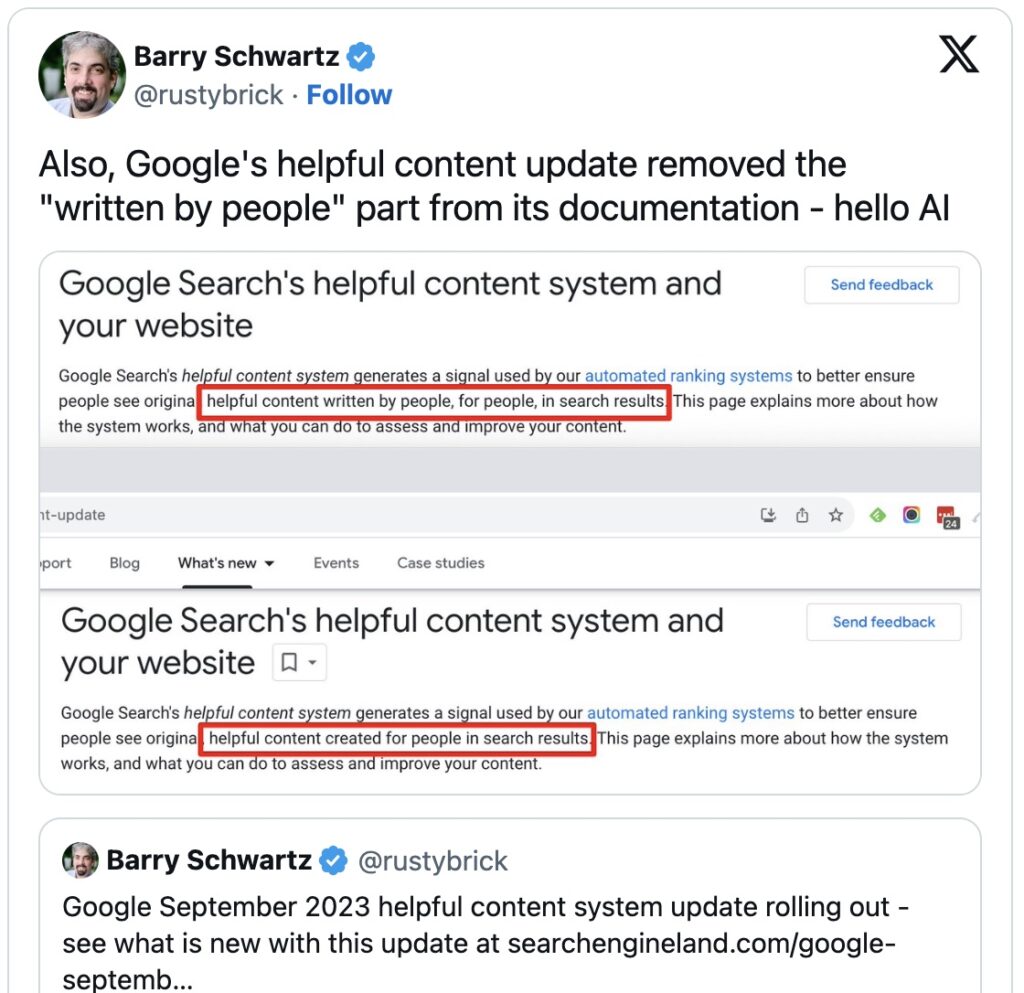As technology continues to advance, AI-generated content is becoming more prevalent across multiple platforms. However, with this rise comes the need for guidelines and regulations to maintain a high standard of information available to users. As a leader in search technology, Google has developed specific policies to address these challenges. Understanding Google’s algorithm for AI-generated content is critical for businesses and content creators alike.
Understand Google’s algorithm for AI-generated content and explore how it impacts search engine rankings.
For those readers who do not have time to read the full article, I suggest this short summary.
Contents:
- Google’s Guidelines for Handling AI-Generated Content
- Understanding Google’s Algorithm for AI-Generated Content
- Ensuring Quality and Authenticity in AI-Generated Content
- The Impact of AI-Generated Content on Search Engine Rankings
- Addressing Ethical Concerns Surrounding AI-Generated Content
- The Future of AI-Generated Content and Google’s Role in Moderation
1. Google’s Guidelines for Handling AI-Generated Content
Google has established a comprehensive set of policies to manage AI-generated content and ensure that it meets the company’s high standards for quality and relevance. These policies are designed to maintain the integrity of search results and provide users with accurate and useful information. Google’s algorithms are trained to identify and evaluate AI-generated content, taking into account factors such as originality, relevance and user experience.
The tech giant is particularly strict about the authenticity of content. It discourages the use of AI tools that automatically generate text without human intervention or oversight. This is because such content often lacks depth and context, leading to a poor user experience. Google encourages creators to use AI responsibly, using its capabilities to enhance their content rather than replace human creativity and expertise.
In addition, Google’s policies emphasize transparency in the use of AI-generated content. Sites using such content are expected to clearly disclose this fact to their users. This not only builds trust, but also helps users understand the nature of the information they’re consuming. By following these guidelines, creators can ensure that their AI-generated content meets Google’s standards and contributes positively to their SEO efforts.
2. Understanding Google’s Algorithm for AI-Generated Content
Google’s AI content algorithm is a complex system that understands, categorizes, and ranks content using machine learning and natural language. The algorithm is designed to prioritize content that is high-quality, relevant, and provides value to the user. It does this by analyzing several factors, such as the relevance of the content to the search query, the authenticity of the information provided, and the overall user experience on the site.
How well the AI-generated content adheres to Google’s guidelines is also taken into account by the algorithm. For example, if an AI tool generates spammy or low-quality content that doesn’t provide value to users, Google’s algorithm will likely penalize it in search rankings. On the other hand, if an AI tool produces high-quality, informative content that complies with Google’s guidelines and meets user intent, it can potentially rank higher in search results.
It’s important to note that while Google’s algorithm is sophisticated enough to handle AI-generated content effectively, it still values human input. The company encourages site owners and creators to review and edit AI-generated content before publishing it online. This ensures that the material not only meets Google’s quality standards, but also provides a positive user experience. Understanding how this algorithm works can help businesses use AI tools more effectively while ensuring their digital presence meets Google’s standards.
3. Ensuring Quality and Authenticity in AI-Generated Content
As AI-generated content becomes more prevalent, Google has taken steps to ensure the quality and authenticity of such content. The tech giant uses advanced algorithms to detect and evaluate AI-generated content to ensure it meets its high standards for quality. These algorithms are designed to assess the relevance, usefulness and originality of the content. They also look for signs of manipulation or deceptive practices that could indicate low-quality or inauthentic content.
Google’s commitment to quality extends to all forms of content, including those generated by artificial intelligence. This is critical as AI-generated content continues to evolve and become more sophisticated. For example, Google’s algorithm can now distinguish between articles written by humans and those written by AI. It does this by looking at factors such as sentence structure, keyword usage, and even the flow of ideas throughout the text. This ensures that only high-quality, authentic content makes it to their search engine results pages (SERPs).
However, it’s important to note that while Google’s algorithms are sophisticated, they are not infallible. There may be instances where low-quality or inauthentic AI-generated content slips through the cracks. To combat this issue, Google encourages users to report any suspicious or low-quality content they encounter on the platform. This collaborative approach helps maintain the integrity of their SERPs and ensures that users always have access to high-quality information.
4. The Impact of AI-Generated Content on Search Engine Rankings
Understanding this relationship is critical for anyone involved in digital marketing or SEO because AI-generated content has a significant impact on search engine rankings. Google’s algorithms are designed to prioritize high-quality, relevant content that provides value to users. As AI becomes more sophisticated, it can generate content that meets these criteria and potentially rank higher than human-written content. However, it’s important to note that Google’s algorithms also take into account factors such as originality and authenticity. These can be difficult for AI to replicate.
While AI-generated content may be able to mimic human writing styles and produce large amounts of content quickly, it may lack the nuanced understanding and creativity that is inherent in human writing. This could result in a lower ranking if the algorithm determines that the content is not original or does not provide unique insights. In addition, Google’s guidelines emphasize the importance of E-A-T (Expertise, Authoritativeness, Trustworthiness), which may be difficult for AI-generated content to convincingly demonstrate.
On the other hand, when used correctly and ethically, AI-generated content can improve SEO efforts by automating certain tasks such as optimizing keywords and creating meta descriptions. It can also help companies scale their content production without sacrificing quality. However, striking a balance between automation and authenticity is key to leveraging AI for SEO while adhering to Google’s guidelines. As we move into an increasingly digital age, understanding how AI impacts search engine rankings will become even more important.
5. Addressing Ethical Concerns Surrounding AI-Generated Content
As AI-generated content becomes more prevalent, ethical concerns inevitably arise. These concerns primarily revolve around the authenticity of the content, potential misuse, and the impact on jobs in the content creation fields. As a leader in the field, Google has a responsibility to address these issues head on. The company is committed to ensuring that AI-generated content is used ethically and responsibly, with clear guidelines and policies in place to prevent misuse.
One of the main ethical concerns around AI-generated content is its potential to spread misinformation or fake news. To combat this, Google’s algorithms are designed to prioritize quality and authenticity. They are continually updated to detect and demote low-quality content or content that appears to have been generated by a machine without human oversight. This not only helps maintain the integrity of information online, but also ensures that users can trust the content they find through Google’s search engine.
Another major concern is the displacement of jobs due to automation. As AI becomes capable of generating high-quality content, there are fears that writers and other creative professionals will become obsolete. However, Google emphasizes that AI should be seen as a tool rather than a replacement for human creativity. It can help automate mundane tasks and provide insights based on data analysis, but it cannot replicate human emotion and perspective, which are crucial elements of storytelling. By proactively addressing these ethical concerns, Google aims to foster an environment where AI enhances human creativity rather than replacing it.

As noted by Barry Schwartz of Search Engine Roundtable, where he specializes in SEO issues, Google has removed the “written by humans” annotation from its so-called “helpful content system” after its latest search algorithm update. Now it just says:
Google Search’s helpful content system generates a signal used by our automated ranking systems to better ensure people see original, helpful content created for people in search results.
6. The Future of AI-Generated Content and Google’s Role in Moderation
As we look to the future, AI-generated content will become even more prevalent. This surge in AI-generated material presents a unique challenge for Google and other search engines. They must find ways to effectively moderate this content, ensuring that it meets quality standards and provides value to users. Google’s role in this process will be critical as they continue to refine their algorithms and policies to handle the increasing influx of AI-generated content.
Google’s commitment to maintaining the integrity of its search results means that it must stay ahead of the curve when it comes to moderating AI-generated content. This could mean developing more sophisticated algorithms that can distinguish between human- and machine-generated text, or implementing stricter policies for sites that rely heavily on AI to create content. The goal is not only to prevent spammy or low-quality content from ranking highly, but also to ensure that users can trust the information they find through Google’s search engine.
However, this task is not without its challenges. The ethical issues surrounding AI-generated content are likely to become more complex as the technology advances. For example, there may be issues related to bias in AI algorithms or questions about who bears responsibility for misinformation spread by AI systems. As a leader in both technology and information dissemination, Google has an important role to play in addressing these concerns and shaping the future landscape of AI-generated content.
